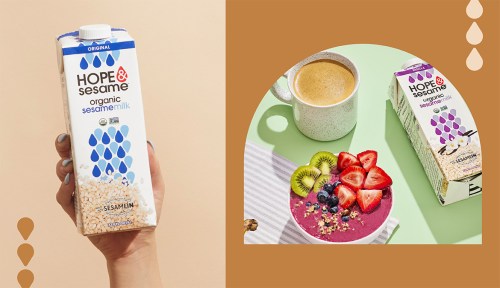Our editors independently select these products. Making a purchase through our links may earn Well+Good a commission
With the many (many) alternative milks on the market now, it’s easy to forget about good old cow’s milk. The vegan milk revolution has been incredible, giving people who can’t digest dairy (or live an animal product-free life by choice) the ability to enjoy lattes, ice cream, cheese, and everything else that would otherwise be off the table.
Experts in This Article
Julia Stamberger is the founder and CEO of Spinning Wheel Brands, which is made up three brands: Hope & Sesame, Veggicopia, and Mozaics.
registered dietitian nutritionist and author of The Plant-Powered Diet
But while different alternative milks do have their own special nutritional benefits, cow’s milk still remains the best milk source of nutrients like calcium, vitamin A, and vitamin D. The latter nutrient is one that nearly half of Americans aren’t getting enough of. That’s a big deal because vitamin D is crucial for supporting a healthy immune system, digestive health, and even protecting against certain types of cancer. If you’re looking for a way to get enough of the nutrient but cow’s milk isn’t an option for you, there’s a new alternative milk (yep, another one) on the market that has even more vitamin D than cow’s milk: Hope & Sesame milk.
As you may have gleaned from its name, this new alt is made with sesame seeds. When asked why the world needed yet another vegan milk option—Spinning Wheel Brands (Hope & Sesame’s parent company) founder and CEO Julia Stamberger says it’s because most of the options out there are pretty nutrient-void, primarily made with water and sugar. “Each serving of Hope & Sesame sesame milk contains all nine essential amino acids, eight grams of complete plant-based protein, is an excellent source of vitamin D, and is a good source of calcium—with less sugar than dairy milk,” she says, adding that it’s also free of the seven most popular allergens (including nuts). One serving of the sesame milk has a full 50 percent of the daily recommended value of vitamin D. To compare, one serving of 2 percent cow’s milk has 15 percent of the daily recommended value.
Besides sesame seeds, the sesame milk also has pea protein added to it, upping the total protein content to eight grams per serving. “Animal proteins are complete; vegan and plant proteins are often incomplete on their own and need to be combined appropriately to achieve a complete protein. Many cultures consume rice and beans together for this reason, for instance,” Stamberger says. “Including pea protein in our sesame milks enabled us to further extend the amino acid chain in sesame to provide a complete protein with a balance of all nine essential amino acids.”
When asked about how Hope & Sesame milk held up nutritionally, nutrition expert Sharon Palmer, RD, (who is completely unaffiliated with the brand) says it holds up. “Blending the sesame seeds with pea protein gives it a protein amount similar to cow’s milk,” she says. “It also has healthy fats and a good source of iron—important for plant-based diets.” She adds that the high vitamin D and calcium clients were also noteworthy.
What alternative milk is the healthiest of all? Watch the below video to find out:
In addition to being nutritionally sound, Stamberger says being sustainable was another value that was important to the brand when creating the milk. “Planet-friendly sesame thrives in dry climates with little water, supports low-input and rotational farming practices, is naturally pest-resistant, and can self-pollinate, thereby helping to conserve bee populations,” she says.
The brand sells five different flavors of the sesame milk: unsweetened original, original, vanilla, chocolate, and chocolate hazelnut (all $28 for a six-pack). The chocolate hazelnut is particularly popular because it tastes like liquid Nutella—talk about a yummy way to sweeten up your coffee.
This milk really checks off all the boxes in terms of nutrition, sustainability, and taste—a win all the way around. Point being? It turns out the world *did* need another alt-milk after all.
Oh hi! You look like someone who loves free workouts, discounts for cutting-edge wellness brands, and exclusive Well+Good content. Sign up for Well+, our online community of wellness insiders, and unlock your rewards instantly.
Sign Up for Our Daily Newsletter
Get all the latest in wellness, trends, food, fitness, beauty, and more delivered right to your inbox.
Got it, you've been added to our email list.











